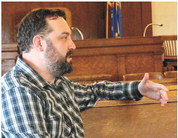Gilman School Board focuses on dealing with pandemic crisis
COVID-19 was a hot topic discussion during Gilman’s school board meeting on March 16.
Gilman superintendent Wally Leipart laid out future plans for the district, but he emphasized that the situation is ever-changing so the plan is fluid and malleable to match it.
The board discussed the nuclear option of shutting down the school for the remainder of the school year. The school later ended up being closed indefinitely, due to Gov. Evers ordering a statewide ban on all gatherings of more than 10 people.
Right now, the school is in the process of setting up online courses on the Wisconsin eSchool Network, of which there’s already 50 thousand students across the state taking courses through the system.
Teachers will still have to come into the school building from 8 a.m. to 3:30 p.m. and have to keep in contact with students through the e-classroom, email, or phone. Leipart says that teachers will still be largely in charge of directing work flow, and telling students what to expect from the day and what school work must be done.
“We are going to say they have to come to the building as long as we don’t get more restrictions,” Leipart said. “We have to standardize that process though. We have to make this simple for teachers, simple for students, and simple families.
Additionally, teachers will not be held to their standard hours requirement, but Leipart says that education is still the main focus, and that the teachers’ hours reduction shouldn’t heavily effect the students.
“It’s not about the bottom line, it’s about getting kids ready for the future... We have seniors getting ready to graduate, and kids transitioning schools.”
Teachers’ wages will remain the same for the month, but it’s unknown what will happen in April. An option was available to reduce their wages by 27 days, but it was unanimously voted to keep all staff at their current pay and to reassess the situation next month.
“It would be a very poor decision,” said Leipart. “It doesn’t show confidence in the staff as professionals and it doesn’t create good faith moving forward.”
There are some students who rely on school lunches for a full meal, and Leipart said they will all be properly taken care of.
“Breakfast and lunches will be delivered to the homes of students that need it,” he said. “It’s the latch-key kids. Mom’s going to go to work, dad’s going to go to work, the kids are going to stay home. This is a big deal... Some kids, maybe their parents are at work all day, or maybe they just plain don’t have anything else to eat. We are going to make sure those kids are looked after.”
The meals will be likely be delivered by school bus drivers, who are still under contract and have hours to fulfill.
“I don’t know that we’ll need all our bus drivers, but if we’re going to be on the hook to pay a bus contract we might as well have the buses go down the road and help with deliveries.”
Though he kept a level head and is handling the situation as it throws itself at him, Leipart didn’t sugar coat the reality of the virus: “The sobering thing is that we went from ten cases to 47 in six days. We are having deaths in the United States. We’ve already engaged the crises team, and they will have their first meeting on Thursday to prepare for what to do if we have a major illness in our community, especially when our kids are around,” he said. “Heaven forbid, but what if we have a death? So we are initiating all these different things to make sure we are ready and prepared to help our students and staff in one of the most complex experiences that we could ever imagine.”




